人教版高中英语必修一Unit-4 Earthquakes Grammar The Attributive Clause 课件(31张PPT)
文档属性
| 名称 | 人教版高中英语必修一Unit-4 Earthquakes Grammar The Attributive Clause 课件(31张PPT) |
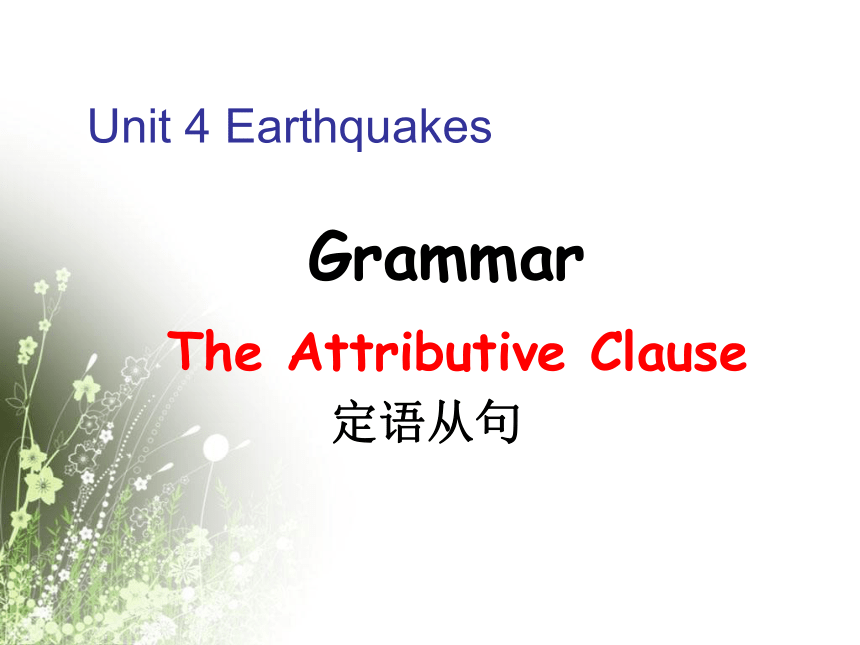
|
|
| 格式 | zip | ||
| 文件大小 | 377.0KB | ||
| 资源类型 | 教案 | ||
| 版本资源 | 人教版(新课程标准) | ||
| 科目 | 英语 | ||
| 更新时间 | 2020-04-01 12:04:49 | ||
图片预览

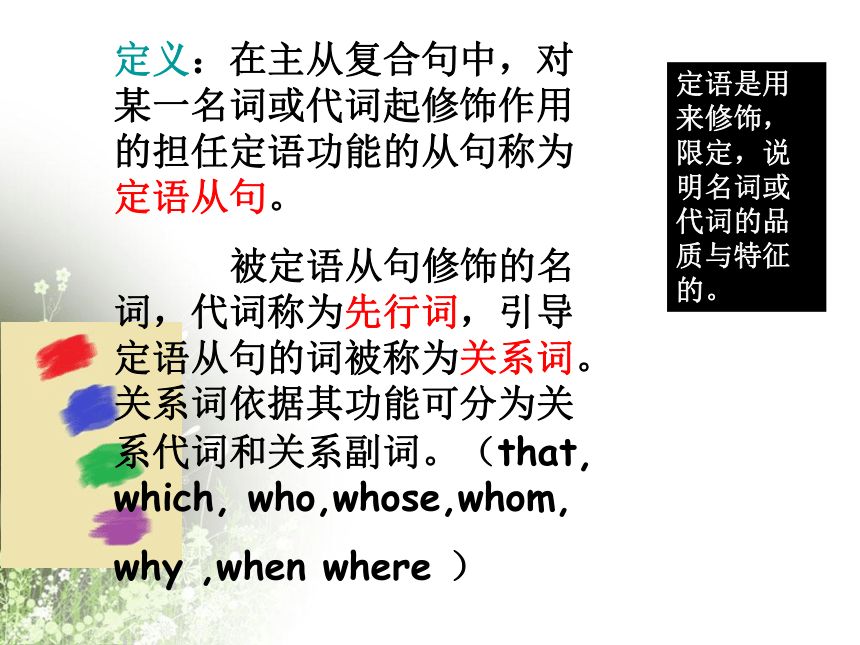
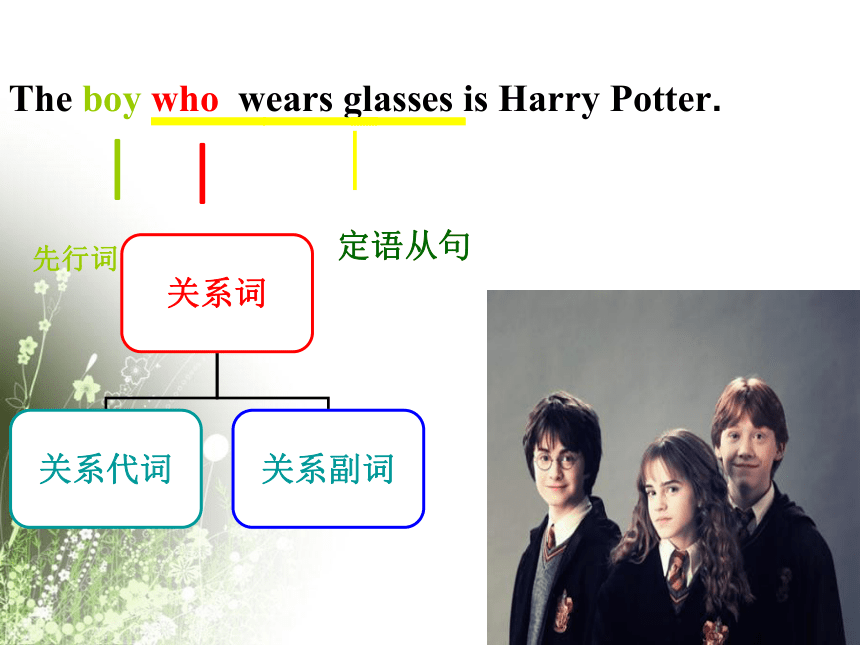
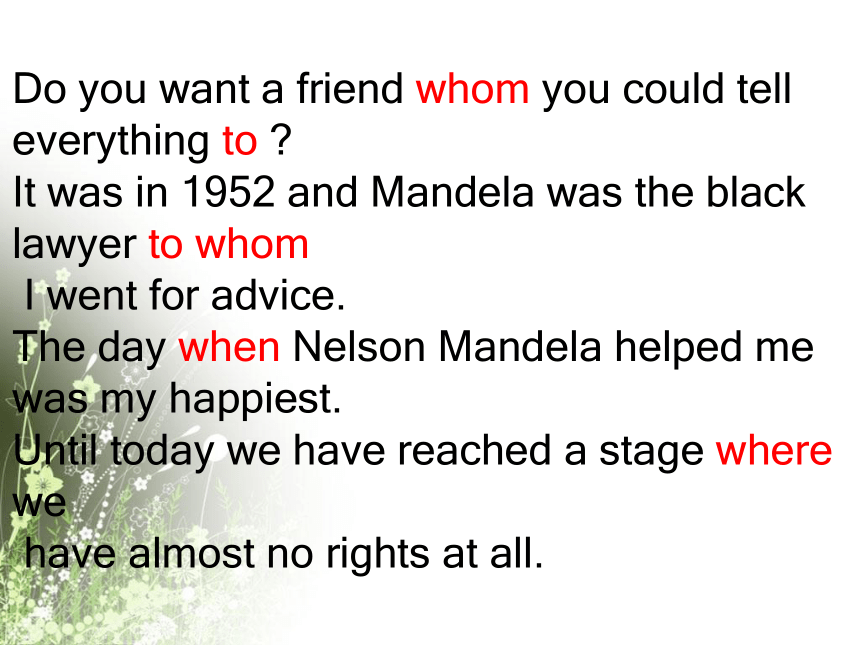
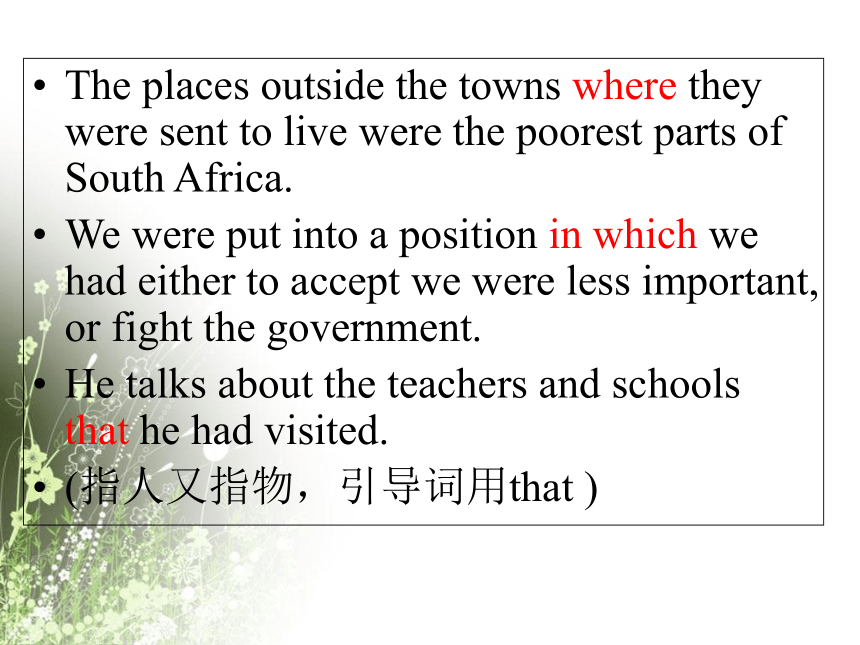
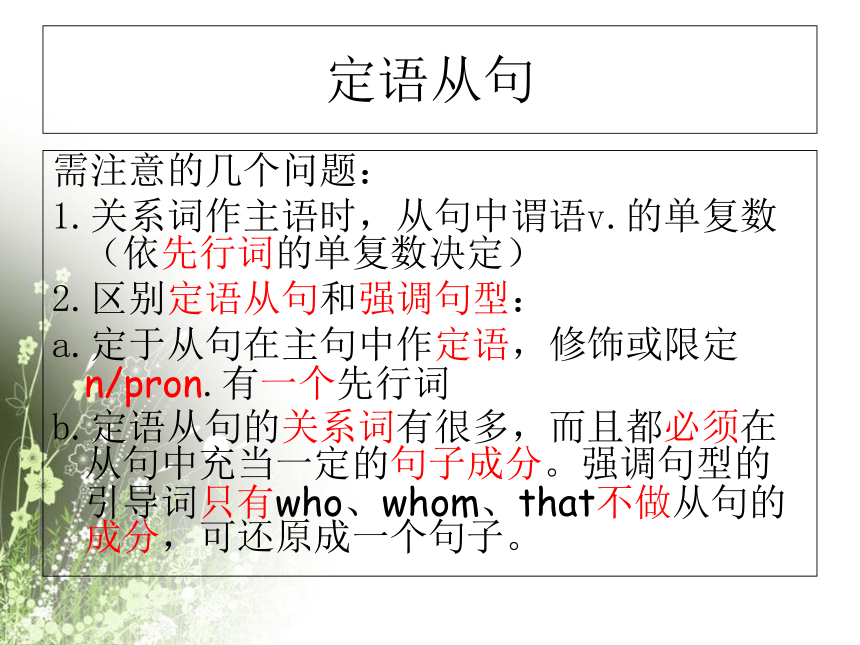
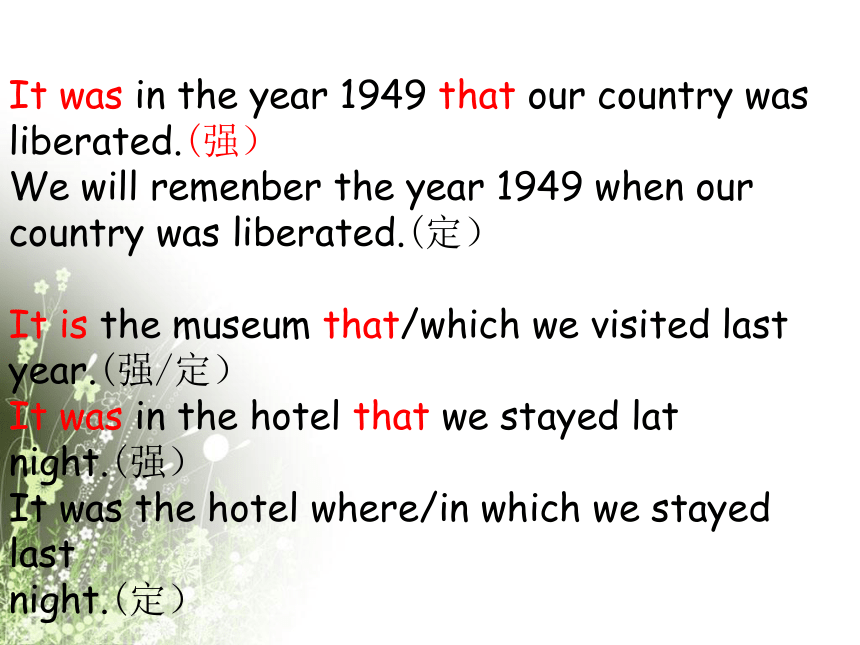
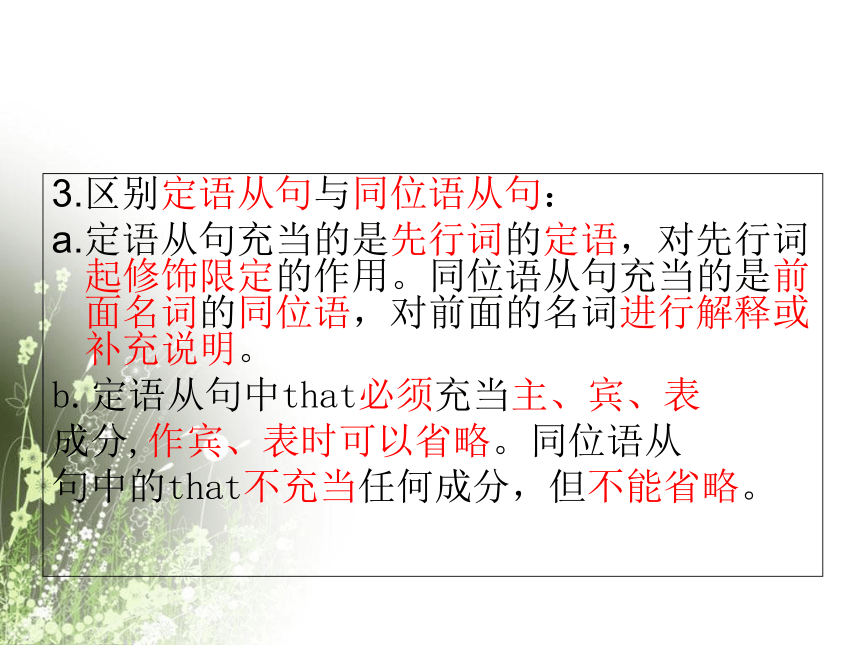
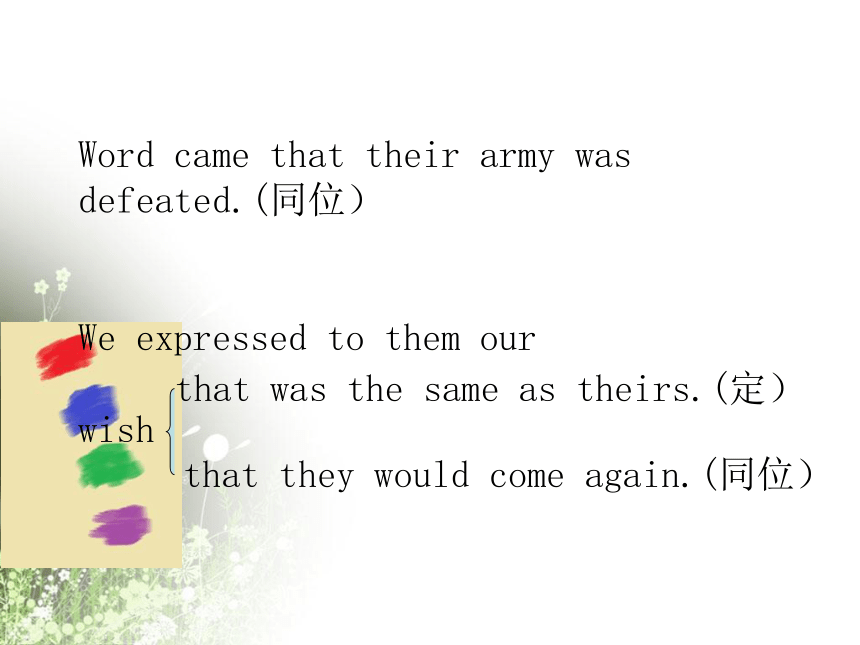
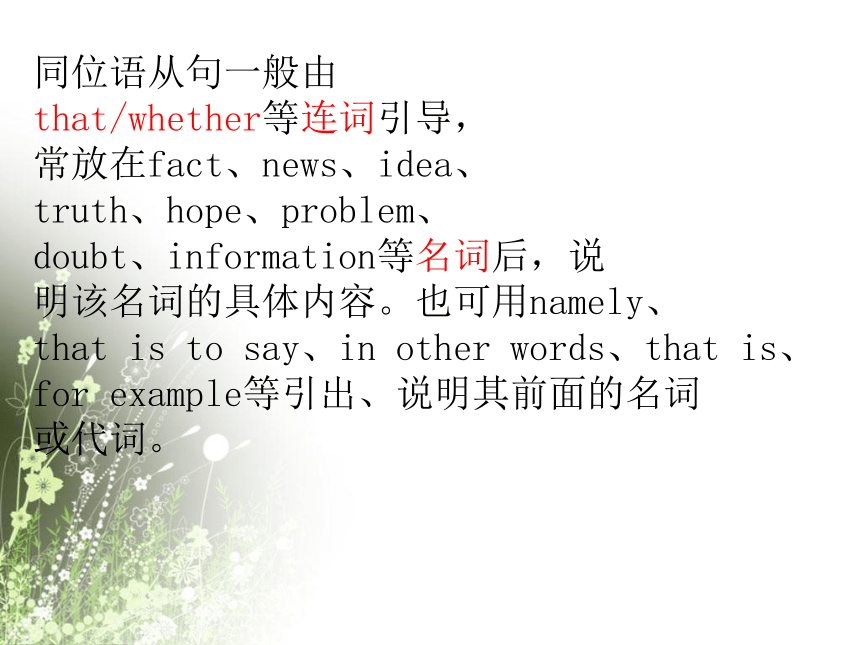
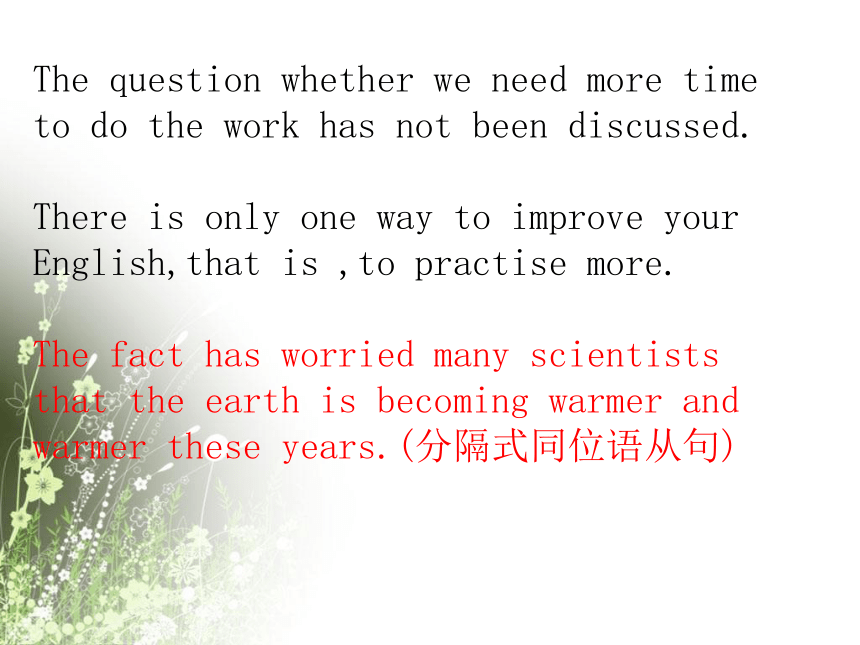
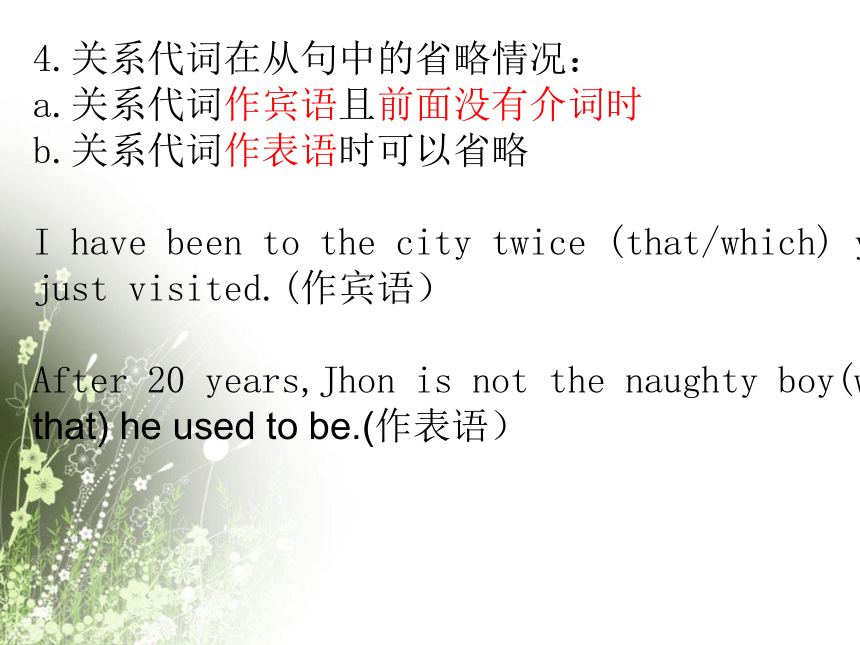
文档简介
(共31张PPT)
Grammar
The Attributive Clause
定语从句
Unit 4 Earthquakes
定义:在主从复合句中,对某一名词或代词起修饰作用的担任定语功能的从句称为定语从句。
被定语从句修饰的名词,代词称为先行词,引导定语从句的词被称为关系词。关系词依据其功能可分为关系代词和关系副词。(that, which, who,whose,whom,
why ,when where )
定语是用来修饰,限定,说明名词或代词的品质与特征的。
The boy who wears glasses is Harry Potter.
︱
—
—
—
︱
︳
先行词
定语从句
Do you want a friend whom you could tell everything to ?
It was in 1952 and Mandela was the black lawyer to whom
I went for advice.
The day when Nelson Mandela helped me was my happiest.
Until today we have reached a stage where we
have almost no rights at all.
The places outside the towns where they were sent to live were the poorest parts of South Africa.
We were put into a position in which we had either to accept we were less important, or fight the government.
He talks about the teachers and schools that he had visited.
(指人又指物,引导词用that )
需注意的几个问题:
1.关系词作主语时,从句中谓语v.的单复数(依先行词的单复数决定)
2.区别定语从句和强调句型:
a.定于从句在主句中作定语,修饰或限定n/pron.有一个先行词
b.定语从句的关系词有很多,而且都必须在从句中充当一定的句子成分。强调句型的引导词只有who、whom、that不做从句的成分,可还原成一个句子。
定语从句
It was in the year 1949 that our country was
liberated.(强)
We will remenber the year 1949 when our
country was liberated.(定)
It is the museum that/which we visited last
year.(强/定)
It was in the hotel that we stayed lat night.(强)
It was the hotel where/in which we stayed last
night.(定)
3.区别定语从句与同位语从句:
a.定语从句充当的是先行词的定语,对先行词起修饰限定的作用。同位语从句充当的是前面名词的同位语,对前面的名词进行解释或补充说明。
b.定语从句中that必须充当主、宾、表
成分,作宾、表时可以省略。同位语从
句中的that不充当任何成分,但不能省略。
Word came that their army was
defeated.(同位)
We expressed to them our
wish
that was the same as theirs.(定)
that they would come again.(同位)
同位语从句一般由
that/whether等连词引导,
常放在fact、news、idea、
truth、hope、problem、
doubt、information等名词后,说
明该名词的具体内容。也可用namely、
that is to say、in other words、that is、
for example等引出、说明其前面的名词
或代词。
The question whether we need more time
to do the work has not been discussed.
There is only one way to improve your
English,that is ,to practise more.
The fact has worried many scientists that the earth is becoming warmer and warmer these years.(分隔式同位语从句)
4.关系代词在从句中的省略情况:
a.关系代词作宾语且前面没有介词时
b.关系代词作表语时可以省略
I have been to the city twice (that/which) you
just visited.(作宾语)
After 20 years,Jhon is not the naughty boy(who/
that) he used to be.(作表语)
5.限制性定语从句起限定作用,是主句不可缺少的部分,与先行词间无逗号。如果去掉,主句的意思不完整或失去意义。
?Those who want to go please sign your names here.
想去的人请在这里签名。
?The accident happened on the day when I lost my job.
事故发生在我失业的那一天。
?He is the man whom I want to see.
他就是我想见的那个人。
6.几个特例的定语从句句型
(1)He is one of the students who are
praised by the teacher.
He is the only one of the students who is
praised by the teacher.
(2)Is this the factory (that) you visited
last year?
Is this factory the one (taht) you visited last
year?
(3)He stood at the window,from where he
could see the park.
He stood at the window form where he
could pick the apples on the tree.
(4)It may rain, in which case the match will be put off. 在这种情况下(特定的句型)
(5)
such…
as(定从)
that(状从)
the same…
that (同一)
as (同类)
This is such an easy question as I can
answer.
This is such an easy question that I can
answer it.
This is the same book that he lent me last
week.
This is the same book as he lent me last
week.
限制性定语从句中引导从句的关系词
(1)指人,在从句中作主语,用who/that,不能省略,
在从句中作宾语时,用whom/that,在口语和非正式文体中可以省略。在从句中,放在介词后面只能用whom。
eg: This is the stranger who/that saved the boy's life.(主语)
The professor (whom/that/who) you wish to see
has come.(宾语,可省略)
The policeman to whom Mr. Smith is speaking in the office is a friend of mine.
(2)指物,在从句中作主语、宾语时,用which或
that,作宾语时可省略。但在从句中,放在介词
后面的只能用which。
This is the game which/that is popular with
children.(主语)
The meat (which/that) we bought yesterday
was not fresh.(宾语)
The hotel at which he stayed offered free
breakfast.
(3)指人或物,在从句中作定语时,用whose。
whose还可以和它所修饰的词一起作介词宾语,
构成“介词+whose+名词”结构。
Do you know the girl whose clothes are
white?(指人)
The building whose roof is under repairs is
Bank of China.(指物)
The boss in whose department Mr.King worked
had heard about the accident.
非限制性定语从句与主句关系不十分密切,一般
用逗号隔开。
非限制性定语从句的关系词
(1)当先行词指人时,用who,whom,whose引导非
限制性定语从句
The students,who arrived yesterday,began to
be trained.
I have many friends, of whom some are
businessmen.
Mr.King,whose legs were badly hurt,was qucikly
taken to hospital.
(2)当先行词指物时,用whose,which引导
The dam, which is the biggest in the world,
is 3,800 meters long.
世界上最长的大坝有三千八百米长。
A company,whose boss is an American,
will open next month.
下个月一家公司将要开业,它的老板是个
美国人。
三、关系副词:在定语中充当状语。
1.where,代替表示地点的先行词在定语从句中作地点状语。
(1)The place where I was born is Wudang Mountain.
(2)The city where they will go is New York.
2.when 代替表示时间的先行词在定语从句中做时间状语。
(1)I still remember the day when we first met.
(2)The days when we stayed at the beautiful countryside is unforgettable.
3.why:一般跟在先行词reason后,why在定语从句中作原因状语。
(1)我来是为了解释没有参加会议的原因。
I have come around to explain the reason why I didn't join the meeting.
(2)你能告诉我你拒绝这个邀请的原因吗?
Can you tell me the reason why you refused the invitation?
当先行词是地点、时间
名词或reason时,“介词
+which”常常可以被where,
when,why代替
At last,he left the city in which/where he
lived.
His father died the year in which/when he
was 16.
This is the reason for which/why he was
dismissed.
1.The new computer,___________________,
breaks down frequently.(love)
他非常喜爱的电脑频繁出故障。
2.The reason_______________was that he
had to send his grandma to a hospital.(late)
他迟到的原因是不得不送奶奶去医院。
3.An earthquake destroyed his house,_______
______________for twenty years.(live)
地震摧毁了他居住20年的家。
4.Global warming has become a serious
problem,_____________________more
attention.(pay)
全球变暖已成为一个严重的问题,我们应该给予
更多关注
which he loves a lot
why he was late
in which
he had lived
to which we should pay
"介词+关系代词”前还可以用some,any,none,
all,both,neither,many,most,each,few等与
代词、名词或数词构成复杂介词。
His sons,both of whom loved music very much,
spent most of their money on CDs.
She is reading a book,the name of which I
don't know.
as引导定语从句,多和such,so,the same连用,
作主语,宾语,表语,不可省略。
We have found such materials as are used in
their factory.(主语)
He is so good a teacher as everybody
likes.(宾语)
He is not the same man as he was.(表语)
as也可引导非限制性定语从句,代指整个主句,
放在主句之前或之后。
He opposed the idea, as we expected.
As we expected, he opposed the idea.
引导非限制性定语从句时,as和which的区别
(1)当先行词不是一个单词,而是整个句子时,
可用which也可用as。放在主句之前时,只用as
He was a foreigner,which/as I knew from his
accent.
As we know, smoking is harmful to one's health.
(2)主句和从句表示因果关系时,用which
He changed his mind, which made others angry.
(3)当从句为否定句时,用which
The weather is fine today, which we didn't expect.
as引导非限制性定语从句常用固定表达
as is expected正如所期望的
as is supposed正如所预料的
as we all know 众所周知
as is often the case情况常常这样
as often happens 正如经常发生
as has been pointed before如以前所说
As we had expected,Zhang Yining won the
champion.
1.John invited about 40 people to his party ,____________ family members. (most)
John 邀请大约40人参加他的派对,大部分是家庭成员。
2.The museum will open in the spring with an exhibition and a viewing platform________
the big glasshouses being built. (watch)
这个博物馆在春季将会有一个展览和观看台,在展览台上人们可以观看修建玻璃房。
3. The children,_______________ the whole day long, were worn out. (play)
玩了一整天的孩子们全部都精疲力竭了。
4. He may win the competition ,__________he is likely to get into the national team. (win)
他有可能会赢得这场比赛,那样的话,他就很可能进入国家队。
5. ________________the children, Amy was better by the time the doctor arrived. (case)
就像孩子们一样,当医生到达时,Amy 已经好多了。
6. The air quality in the city,____________ in the report, has improved over the past two
months. (show)
正如报道里所显示,在过去的两个月里城市的空气质量已经改善了。
7. Mary has written two novels, ______________ television series. (make)
玛丽写了两部小说, 两部都被拍成了电视剧。
8. The book tells stories of the earthquake through the eyes of those_________. (affect)
这本书叙述的是地震的故事, 是那些生活受到影响的人们的亲眼目睹的故事。
9. I wish to thank Mr.Wang, ______I would never have gone this far. (help)
我想对王先生表示感谢,没有他的帮助,我就不会取得这么大的成就。
10. That is the new machine___________ are too small to be seen. (part)
那就是那台新机器,它的零件太小了而看不见。
1.go through difficulties/sufferings
2.be concerned about food safety
3. In order not to be late for school
4. be tired of playing computer games
5.persuade his father not to smoke
6.recover from an operation
7.it’s no pleasure doing homework
8.find it easy to get along with new classmates
9.set down your name
10.calm the crying child down
11.Panda is native to China
12.stay outdoors
13.be based on a true story
14.graduate from a famous university
15.give in to the difficulties
16.conquer one’s fear
17.have got to get up early
18.have trouble in learning grammar
19.be present at a meeting
20.suffer from the earthquake
Grammar
The Attributive Clause
定语从句
Unit 4 Earthquakes
定义:在主从复合句中,对某一名词或代词起修饰作用的担任定语功能的从句称为定语从句。
被定语从句修饰的名词,代词称为先行词,引导定语从句的词被称为关系词。关系词依据其功能可分为关系代词和关系副词。(that, which, who,whose,whom,
why ,when where )
定语是用来修饰,限定,说明名词或代词的品质与特征的。
The boy who wears glasses is Harry Potter.
︱
—
—
—
︱
︳
先行词
定语从句
Do you want a friend whom you could tell everything to ?
It was in 1952 and Mandela was the black lawyer to whom
I went for advice.
The day when Nelson Mandela helped me was my happiest.
Until today we have reached a stage where we
have almost no rights at all.
The places outside the towns where they were sent to live were the poorest parts of South Africa.
We were put into a position in which we had either to accept we were less important, or fight the government.
He talks about the teachers and schools that he had visited.
(指人又指物,引导词用that )
需注意的几个问题:
1.关系词作主语时,从句中谓语v.的单复数(依先行词的单复数决定)
2.区别定语从句和强调句型:
a.定于从句在主句中作定语,修饰或限定n/pron.有一个先行词
b.定语从句的关系词有很多,而且都必须在从句中充当一定的句子成分。强调句型的引导词只有who、whom、that不做从句的成分,可还原成一个句子。
定语从句
It was in the year 1949 that our country was
liberated.(强)
We will remenber the year 1949 when our
country was liberated.(定)
It is the museum that/which we visited last
year.(强/定)
It was in the hotel that we stayed lat night.(强)
It was the hotel where/in which we stayed last
night.(定)
3.区别定语从句与同位语从句:
a.定语从句充当的是先行词的定语,对先行词起修饰限定的作用。同位语从句充当的是前面名词的同位语,对前面的名词进行解释或补充说明。
b.定语从句中that必须充当主、宾、表
成分,作宾、表时可以省略。同位语从
句中的that不充当任何成分,但不能省略。
Word came that their army was
defeated.(同位)
We expressed to them our
wish
that was the same as theirs.(定)
that they would come again.(同位)
同位语从句一般由
that/whether等连词引导,
常放在fact、news、idea、
truth、hope、problem、
doubt、information等名词后,说
明该名词的具体内容。也可用namely、
that is to say、in other words、that is、
for example等引出、说明其前面的名词
或代词。
The question whether we need more time
to do the work has not been discussed.
There is only one way to improve your
English,that is ,to practise more.
The fact has worried many scientists that the earth is becoming warmer and warmer these years.(分隔式同位语从句)
4.关系代词在从句中的省略情况:
a.关系代词作宾语且前面没有介词时
b.关系代词作表语时可以省略
I have been to the city twice (that/which) you
just visited.(作宾语)
After 20 years,Jhon is not the naughty boy(who/
that) he used to be.(作表语)
5.限制性定语从句起限定作用,是主句不可缺少的部分,与先行词间无逗号。如果去掉,主句的意思不完整或失去意义。
?Those who want to go please sign your names here.
想去的人请在这里签名。
?The accident happened on the day when I lost my job.
事故发生在我失业的那一天。
?He is the man whom I want to see.
他就是我想见的那个人。
6.几个特例的定语从句句型
(1)He is one of the students who are
praised by the teacher.
He is the only one of the students who is
praised by the teacher.
(2)Is this the factory (that) you visited
last year?
Is this factory the one (taht) you visited last
year?
(3)He stood at the window,from where he
could see the park.
He stood at the window form where he
could pick the apples on the tree.
(4)It may rain, in which case the match will be put off. 在这种情况下(特定的句型)
(5)
such…
as(定从)
that(状从)
the same…
that (同一)
as (同类)
This is such an easy question as I can
answer.
This is such an easy question that I can
answer it.
This is the same book that he lent me last
week.
This is the same book as he lent me last
week.
限制性定语从句中引导从句的关系词
(1)指人,在从句中作主语,用who/that,不能省略,
在从句中作宾语时,用whom/that,在口语和非正式文体中可以省略。在从句中,放在介词后面只能用whom。
eg: This is the stranger who/that saved the boy's life.(主语)
The professor (whom/that/who) you wish to see
has come.(宾语,可省略)
The policeman to whom Mr. Smith is speaking in the office is a friend of mine.
(2)指物,在从句中作主语、宾语时,用which或
that,作宾语时可省略。但在从句中,放在介词
后面的只能用which。
This is the game which/that is popular with
children.(主语)
The meat (which/that) we bought yesterday
was not fresh.(宾语)
The hotel at which he stayed offered free
breakfast.
(3)指人或物,在从句中作定语时,用whose。
whose还可以和它所修饰的词一起作介词宾语,
构成“介词+whose+名词”结构。
Do you know the girl whose clothes are
white?(指人)
The building whose roof is under repairs is
Bank of China.(指物)
The boss in whose department Mr.King worked
had heard about the accident.
非限制性定语从句与主句关系不十分密切,一般
用逗号隔开。
非限制性定语从句的关系词
(1)当先行词指人时,用who,whom,whose引导非
限制性定语从句
The students,who arrived yesterday,began to
be trained.
I have many friends, of whom some are
businessmen.
Mr.King,whose legs were badly hurt,was qucikly
taken to hospital.
(2)当先行词指物时,用whose,which引导
The dam, which is the biggest in the world,
is 3,800 meters long.
世界上最长的大坝有三千八百米长。
A company,whose boss is an American,
will open next month.
下个月一家公司将要开业,它的老板是个
美国人。
三、关系副词:在定语中充当状语。
1.where,代替表示地点的先行词在定语从句中作地点状语。
(1)The place where I was born is Wudang Mountain.
(2)The city where they will go is New York.
2.when 代替表示时间的先行词在定语从句中做时间状语。
(1)I still remember the day when we first met.
(2)The days when we stayed at the beautiful countryside is unforgettable.
3.why:一般跟在先行词reason后,why在定语从句中作原因状语。
(1)我来是为了解释没有参加会议的原因。
I have come around to explain the reason why I didn't join the meeting.
(2)你能告诉我你拒绝这个邀请的原因吗?
Can you tell me the reason why you refused the invitation?
当先行词是地点、时间
名词或reason时,“介词
+which”常常可以被where,
when,why代替
At last,he left the city in which/where he
lived.
His father died the year in which/when he
was 16.
This is the reason for which/why he was
dismissed.
1.The new computer,___________________,
breaks down frequently.(love)
他非常喜爱的电脑频繁出故障。
2.The reason_______________was that he
had to send his grandma to a hospital.(late)
他迟到的原因是不得不送奶奶去医院。
3.An earthquake destroyed his house,_______
______________for twenty years.(live)
地震摧毁了他居住20年的家。
4.Global warming has become a serious
problem,_____________________more
attention.(pay)
全球变暖已成为一个严重的问题,我们应该给予
更多关注
which he loves a lot
why he was late
in which
he had lived
to which we should pay
"介词+关系代词”前还可以用some,any,none,
all,both,neither,many,most,each,few等与
代词、名词或数词构成复杂介词。
His sons,both of whom loved music very much,
spent most of their money on CDs.
She is reading a book,the name of which I
don't know.
as引导定语从句,多和such,so,the same连用,
作主语,宾语,表语,不可省略。
We have found such materials as are used in
their factory.(主语)
He is so good a teacher as everybody
likes.(宾语)
He is not the same man as he was.(表语)
as也可引导非限制性定语从句,代指整个主句,
放在主句之前或之后。
He opposed the idea, as we expected.
As we expected, he opposed the idea.
引导非限制性定语从句时,as和which的区别
(1)当先行词不是一个单词,而是整个句子时,
可用which也可用as。放在主句之前时,只用as
He was a foreigner,which/as I knew from his
accent.
As we know, smoking is harmful to one's health.
(2)主句和从句表示因果关系时,用which
He changed his mind, which made others angry.
(3)当从句为否定句时,用which
The weather is fine today, which we didn't expect.
as引导非限制性定语从句常用固定表达
as is expected正如所期望的
as is supposed正如所预料的
as we all know 众所周知
as is often the case情况常常这样
as often happens 正如经常发生
as has been pointed before如以前所说
As we had expected,Zhang Yining won the
champion.
1.John invited about 40 people to his party ,____________ family members. (most)
John 邀请大约40人参加他的派对,大部分是家庭成员。
2.The museum will open in the spring with an exhibition and a viewing platform________
the big glasshouses being built. (watch)
这个博物馆在春季将会有一个展览和观看台,在展览台上人们可以观看修建玻璃房。
3. The children,_______________ the whole day long, were worn out. (play)
玩了一整天的孩子们全部都精疲力竭了。
4. He may win the competition ,__________he is likely to get into the national team. (win)
他有可能会赢得这场比赛,那样的话,他就很可能进入国家队。
5. ________________the children, Amy was better by the time the doctor arrived. (case)
就像孩子们一样,当医生到达时,Amy 已经好多了。
6. The air quality in the city,____________ in the report, has improved over the past two
months. (show)
正如报道里所显示,在过去的两个月里城市的空气质量已经改善了。
7. Mary has written two novels, ______________ television series. (make)
玛丽写了两部小说, 两部都被拍成了电视剧。
8. The book tells stories of the earthquake through the eyes of those_________. (affect)
这本书叙述的是地震的故事, 是那些生活受到影响的人们的亲眼目睹的故事。
9. I wish to thank Mr.Wang, ______I would never have gone this far. (help)
我想对王先生表示感谢,没有他的帮助,我就不会取得这么大的成就。
10. That is the new machine___________ are too small to be seen. (part)
那就是那台新机器,它的零件太小了而看不见。
1.go through difficulties/sufferings
2.be concerned about food safety
3. In order not to be late for school
4. be tired of playing computer games
5.persuade his father not to smoke
6.recover from an operation
7.it’s no pleasure doing homework
8.find it easy to get along with new classmates
9.set down your name
10.calm the crying child down
11.Panda is native to China
12.stay outdoors
13.be based on a true story
14.graduate from a famous university
15.give in to the difficulties
16.conquer one’s fear
17.have got to get up early
18.have trouble in learning grammar
19.be present at a meeting
20.suffer from the earthquake
